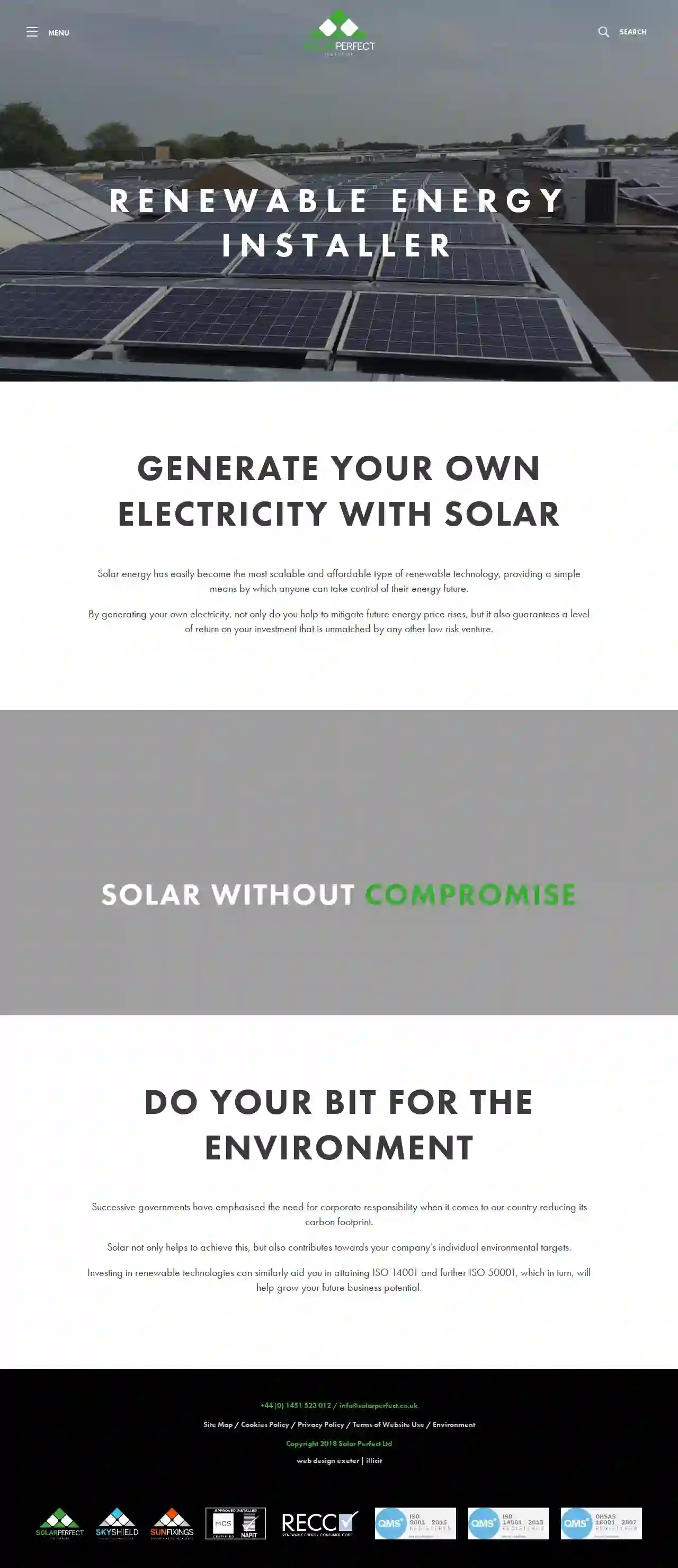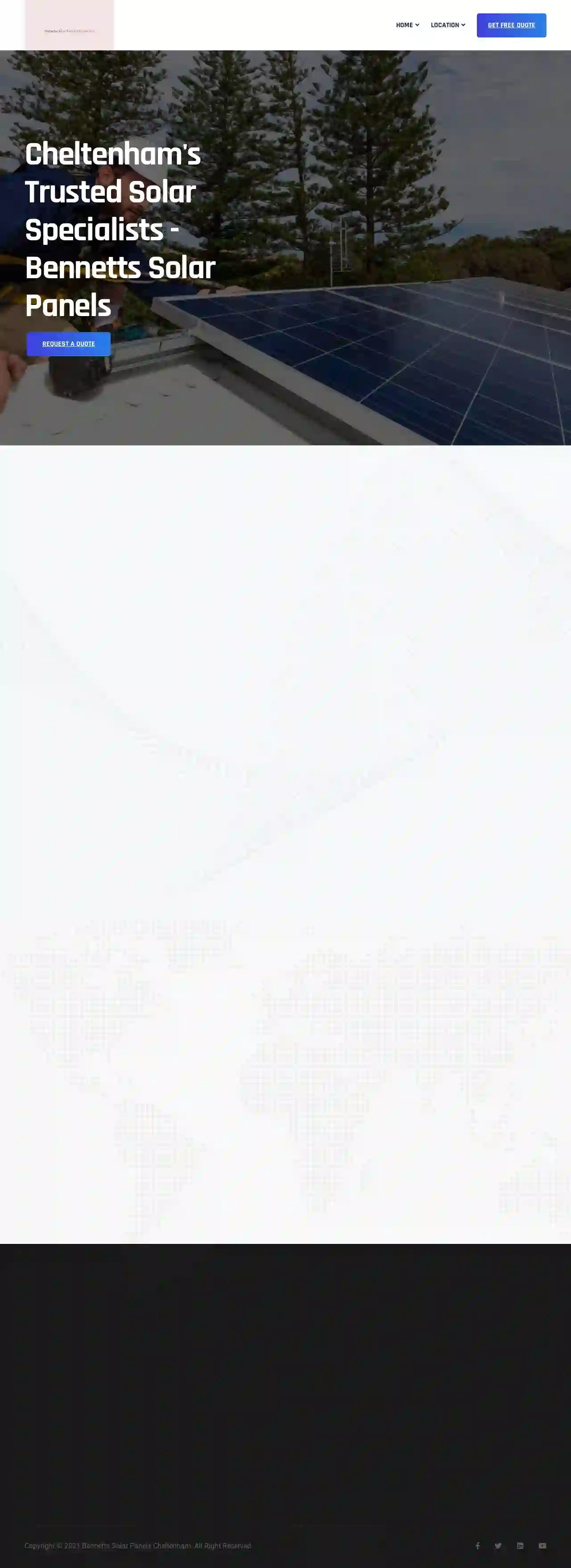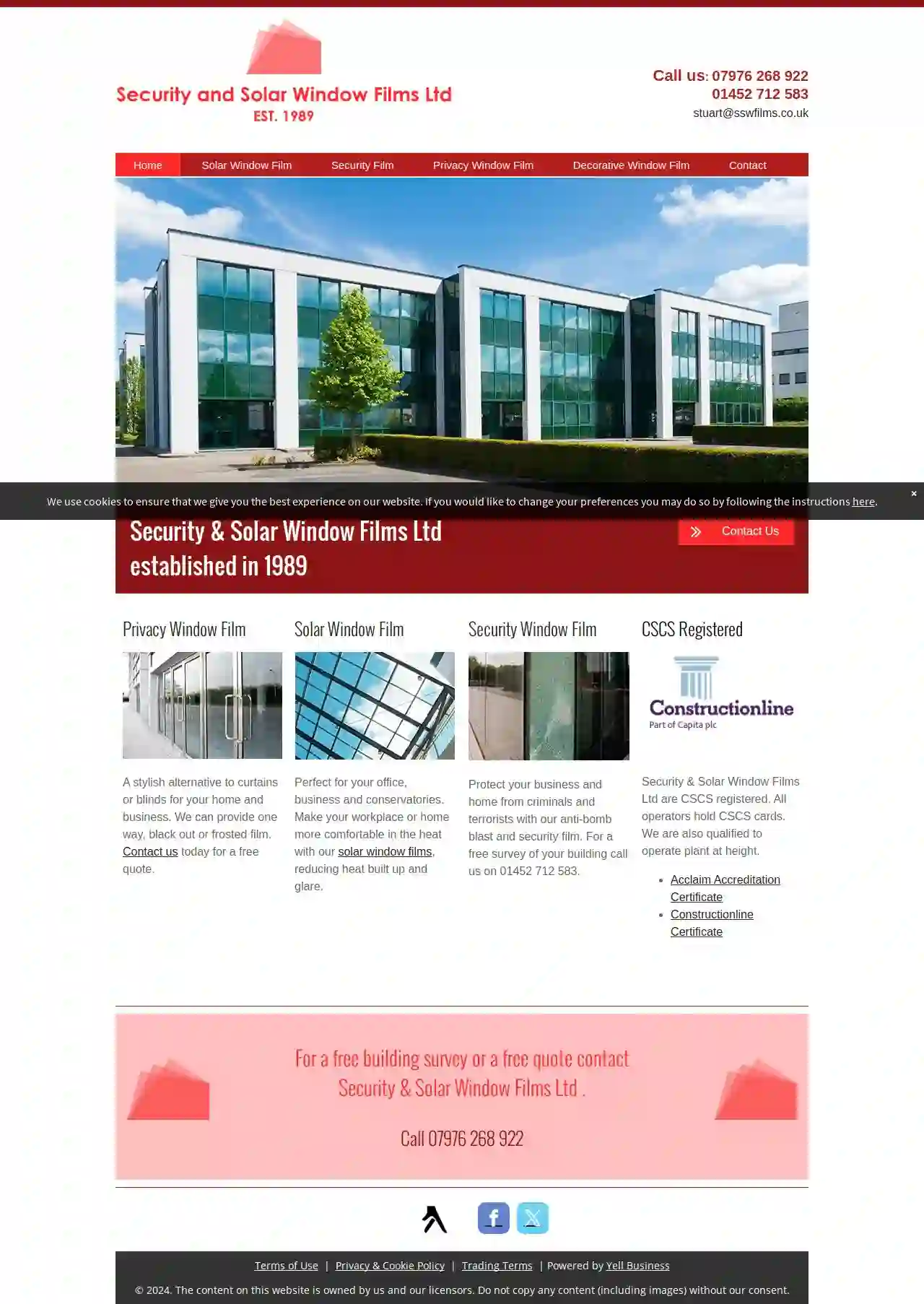Commercial Solar Installers Cheltenham
Top Commercial Solar Companies in Cheltenham
Get up to 3 Commercial Solar Panel Installation quotes for your project today! Compare profiles, reviews, accreditations, portfolio, etc... and choose the best deal.

Solar Perfect Limited
The Old Mill, Lower Sowton Industrial Estate, Unit 1, Exeter, EX2 7AA, GBSolar Perfect is a leading provider of solar PV systems, committed to delivering high-quality, reliable solutions for both residential and commercial clients. We offer a comprehensive range of services, from initial consultation and system design to installation, commissioning, and ongoing maintenance. Our team of experienced engineers and technicians is dedicated to providing exceptional customer service and ensuring that our clients receive the maximum benefit from their solar energy investment. We are passionate about promoting sustainable energy solutions and helping our clients reduce their carbon footprint.
- Services
- Why Us?
- Gallery
Get Quote
Cheltenham Solar Energy
Suite 4F, Drake House, Long Street, Dursley, GL11 4HH, GBHarnessing renewable energy, smarter management & distribution. Harnessing renewable energy, smarter management & distribution. The Immersa approach offers key benefits to businesses and organisations through on-site renewable energy generation with battery storage solutions. This saves money and makes energy use more sustainable as we strive towards net-zero. We use unique modelling software to analyse our clients’ energy supply needs now and in the future. We provide a tailored energy system, which is competitive, cost-effective, and enhances your business credentials for Corporate Social Responsibility.
- Services
- Why Us?
- Our Team
- Gallery
Get Quote
Bennetts Solar Panels Cheltenham
28 Orchard Way, Cheltenham, GL51 7LD, GBNestled in Cheltenham, Bennetts Solar Panels Cheltenham stands as a leading solar installation expert. We blend sustainability with the latest solar innovations, offering our community the best in green energy solutions. Our approach goes beyond installations. At Bennetts, we understand the full solar spectrum, ensuring our projects meet local Cheltenham and national energy standards. With close ties to the Microgeneration Certification Scheme (MCS) and the Department for Business, Energy & Industrial Strategy (BEIS), our installations maintain top-tier quality. Bennetts Solar Panels Cheltenham 28 Orchard Way, Cheltenham GL51 7LD, UK 0124 237 5129 We prioritize partnerships, aligning with top suppliers and manufacturers for premium components. Our collaboration with Cheltenham Borough Council ensures smooth local integrations. Plus, our affiliations with financial entities provide customers with valuable solar investment opportunities. Post-installation, we extend comprehensive maintenance and support, emphasizing system longevity. Supported by trusted insurance providers, we guarantee our clients' peace of mind. Always advancing, Bennetts Solar Panels Cheltenham incorporates the latest industry insights, aiming to foster a greener Cheltenham. Join our sustainable journey and let Bennetts brighten your green energy future.
- Services
- Why Us?
- Accreditations
- Gallery
Get Quote
Innova
Cheltenham, GBInnova Renewables is a company dedicated to creating utility-scale renewable energy projects using a variety of technologies. Their mission is to take large energy-intensive users off-grid and accelerate the decarbonisation process. Established in 2014, Innova boasts a team of over 100 interdisciplinary professionals with a broad capability and a highly commercial approach. They aim to deliver long-term innovative solutions to energy and environmental problems, with an expected capital deployment of £1 billion over five years. Innova's in-house operational capability spans asset management, financial, legal, monitoring, and technical support, working with best-in-class O&M and specialist contractors to deliver their operational strategy. Their expertise across the full project management lifecycle enables them to achieve enhanced performance metrics, longevity, minimize risk, and drive returns.
- Services
- Why Us?
- Gallery
Get Quote
Potentia Engineering Ltd
529 reviews2 Meadrow, Godalming, The White House, GU7 3HN, GBPotentia Engineering was born out of a passion for engineering and renewable energy. I'm Dan, the founder of Potentia Engineering Ltd. Potentia Engineering was born out of my passion for engineering and renewable energy. In the last 5 years, technology in the home has increased exponentially – some time ago, it would have only been possible to design, install and use exciting and interesting equipment, by working in a more technical industrial or corporate setting. This is precisely where I was, and although I enjoyed the ‘tech’, working in a big sprawling organisation wasn’t for me. I have always recognised that more needs to be done to cut our outdated dependence on fossil fuels – it just does not make sense when there are some great substitutes out there – solar energy being just one. The investment needs to start now, and beyond government level. Solar systems are an incredibly powerful tool to unshackle yourself from the grid and breakaway from the enduring energy price volatility surrounding us today. We have some incredible solutions which can help you save money and help us all save the planet. The positives are just too big to ignore! But, at the same time, we understand that it’s an investment, and this requires capital, which right or wrong, not everyone has access to. However, we are witnessing a real shift in wholesale energy prices, which appear to be a permanent feature for at least the medium term. This gives the investment real credibility as every unit you produce at home is a unit you are not buying from the grid. We can help! Just think every time the unit price for electricity doubles, the return (or payback period) for your solar investment halves. We offer friendly advice, whether you choose us or not, we hope you’ll remain a friend to our business.
- Services
- Why Us?
- Accreditations
- Our Team
- Testimonials
- Gallery
Get Quote
Mypower - Commercial Solar Professionals Cheltenham
51 reviewsToddington, Cheltenham, Quercus House, Orchard Industrial Estate, GL54 5EB, GBWelcome to Mypower, the UK's leading commercial solar panel installation company. We design and install solar PV systems for businesses since 2010. Our company is a solar panel company that designs, supplies, and installs award-winning photovoltaic (PV) systems, enabling companies to generate their own electricity, lower their long-term energy costs, and reduce their impact on climate change. We have been in business for over 10 years and have installed over 100,000 solar panels. Our team is highly experienced in commercial solar panels, agricultural, industrial, and community solar installations, including roof, ground mount, and bespoke solutions. We provide a reliable flow of low-priced electricity to use on site, and our solar panels for companies provide a significant reduction in electricity overheads, energy security, and substantial carbon footprint reductions.
- Services
- Why Us?
- Gallery
Get Quote
Security & Solar Window Films Ltd
57 reviewsElm Farm North Road West The Reddings, Cheltenham, GL51 6RG, GBSecurity & Solar Window Films Ltd is a company established in 1989, providing a range of window film solutions for both homes and businesses across the UK. We offer security, solar, privacy, and decorative window films, tailored to meet the specific needs of our clients. Our team is CSCS registered and holds the necessary qualifications to operate plant at height, ensuring a safe and professional service. We are proud to be accredited by Acclaim and Constructionline, demonstrating our commitment to quality and excellence. We understand the importance of protecting your property and creating a comfortable environment. That's why we offer a free building survey to assess your requirements and provide a tailored solution. Contact us today for a free quote and let us help you enhance the security, comfort, and aesthetics of your windows.
- Services
- Why Us?
- Accreditations
- Gallery
Get Quote
Forever Green Energy
4.336 reviewsCheltenham, GBLeading UK Green Energy Supplier Solar panels can save you up to 80% off your electricity bills. Help save the planet and your bank balance by installing the latest solar panels and battery storage systems to your home. Forever Green energy saving systems will help the environment, reduce carbon emissions and help save up to 80% off your electricity bill. Book a quote with a member of our expert team. Why Forever Green Energy? What makes Forever Green Energy different from the rest? Our mission is to create a better way of helping you choose the right green solutions for your home. No hard sales. No persuading you to install something that’s completely wrong for your home. Just honest advice, a high-quality job and excellent customer service.
- Services
- Why Us?
- Testimonials
- Gallery
Get Quote- Gm
GmSeptic Solar
Cheltenham, GB- Services
- Why Us?
Get Quote - So
Solar 3C
Cheltenham, GB- Services
- Why Us?
Get Quote
Over 3,485+ Solar Installers in our network
Our solar contractors operate in Cheltenham & surrounding areas!
SolarCompaniesHub has curated and vetted Top Solar Installers near Cheltenham. Find a trustworthy contractor today.
Frequently Asked Questions About Commercial Solar Installations
- Ample Space: Flat roofs typically have more usable space than sloped roofs, allowing for larger solar arrays and greater energy production.
- Ease of Access: Flat roofs are generally easier to access for installation and maintenance.
- Flexibility in Orientation: Solar panels on flat roofs can be tilted and oriented in any direction to optimize sun exposure.
- You pay a fixed monthly lease payment for the use of the solar system.
- You do not own the system.
- You are responsible for maintenance and repairs.
- You typically do not benefit from tax incentives or depreciation.
- You purchase the electricity generated by the solar system at a fixed rate per kilowatt-hour (kWh).
- You do not own the system.
- The third-party owner is responsible for maintenance and repairs.
- You may not be eligible for all tax benefits.
- Qualified Installers: Ensure your installer has the necessary experience, training, and certifications to work safely on commercial roofs and with electrical systems.
- Fall Protection: Proper fall protection measures, such as harnesses and safety lines, must be used when working on roofs to prevent falls.
- Electrical Safety: Solar panels generate electricity, so proper wiring, grounding, and safety disconnects are crucial to prevent electrical shock or fire hazards.
- Fire Safety: Solar panel systems are designed to be fire-resistant, but it's essential to choose reputable brands with appropriate fire ratings and to ensure proper installation to minimize fire risks.
- Permitting and Inspections: Obtaining permits and undergoing inspections by local authorities helps ensure the installation meets safety codes and standards.
- Ongoing Maintenance: Regular maintenance checks by qualified professionals help identify potential safety issues and ensure the system remains safe and operational.
- Uses high-quality mounting hardware
- Follows industry best practices
- Has a good understanding of roofing systems
Can I install solar panels on a flat commercial roof?
What is the difference between a solar lease and a PPA?
Solar Lease:
PPA:
What safety considerations are involved in commercial solar installations?
Will solar panels affect my roof warranty?
Can I install solar panels on a flat commercial roof?
- Ample Space: Flat roofs typically have more usable space than sloped roofs, allowing for larger solar arrays and greater energy production.
- Ease of Access: Flat roofs are generally easier to access for installation and maintenance.
- Flexibility in Orientation: Solar panels on flat roofs can be tilted and oriented in any direction to optimize sun exposure.
What is the difference between a solar lease and a PPA?
Solar Lease:
- You pay a fixed monthly lease payment for the use of the solar system.
- You do not own the system.
- You are responsible for maintenance and repairs.
- You typically do not benefit from tax incentives or depreciation.
PPA:
- You purchase the electricity generated by the solar system at a fixed rate per kilowatt-hour (kWh).
- You do not own the system.
- The third-party owner is responsible for maintenance and repairs.
- You may not be eligible for all tax benefits.
What safety considerations are involved in commercial solar installations?
- Qualified Installers: Ensure your installer has the necessary experience, training, and certifications to work safely on commercial roofs and with electrical systems.
- Fall Protection: Proper fall protection measures, such as harnesses and safety lines, must be used when working on roofs to prevent falls.
- Electrical Safety: Solar panels generate electricity, so proper wiring, grounding, and safety disconnects are crucial to prevent electrical shock or fire hazards.
- Fire Safety: Solar panel systems are designed to be fire-resistant, but it's essential to choose reputable brands with appropriate fire ratings and to ensure proper installation to minimize fire risks.
- Permitting and Inspections: Obtaining permits and undergoing inspections by local authorities helps ensure the installation meets safety codes and standards.
- Ongoing Maintenance: Regular maintenance checks by qualified professionals help identify potential safety issues and ensure the system remains safe and operational.
Will solar panels affect my roof warranty?
- Uses high-quality mounting hardware
- Follows industry best practices
- Has a good understanding of roofing systems